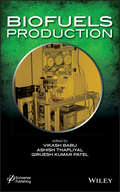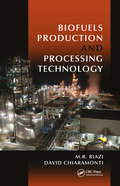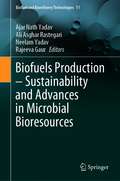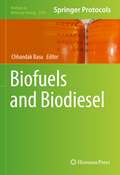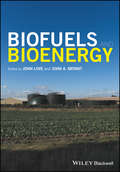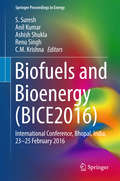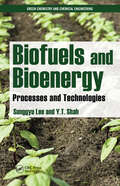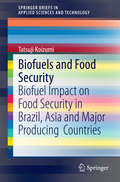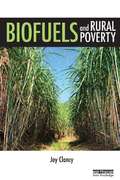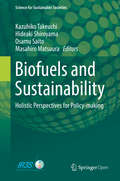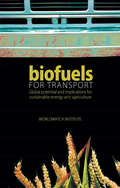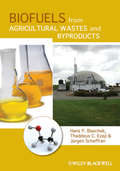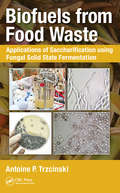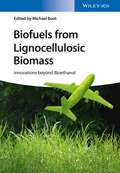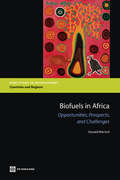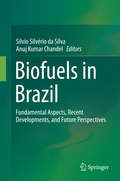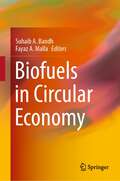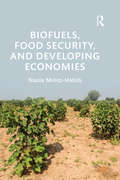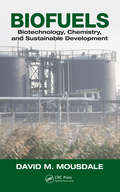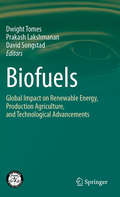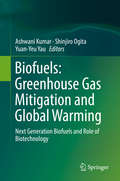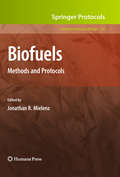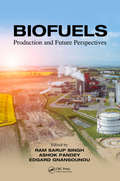- Table View
- List View
Biofuels Production
by Vikash Babu Ashish Thapliyal Girijesh Kumar PatelThe search for alternative sources of energy to offset diminishing resources of easy and cost-effective fossil fuels has become a global initiative, and fuel generated from biomass is a leading competitor in this arena. Large-scale introduction of biofuels into the energy mix could contribute to environmentally and economicaly sustainable development on a global scale. The processes and methodologies presented in this volume will offer a cutting-edge and comprehensive approach to the production of biofuels, for engineers, researchers, and students.
Biofuels Production and Processing Technology (Fuels and Petrochemicals)
by M. R. Riazi David ChiaramontiThe importance of biofuels in greening the transport sector in the future is unquestionable, given the limited available fossil energy resources, the environmental issues associated to the utilization of fossil fuels, and the increasing attention to security of supply. This comprehensive reference presents the latest technology in all aspects of biofuels production, processing, properties, raw materials, and related economic and environmental aspects. Presenting the application of methods and technology with minimum math and theory, it compiles a wide range of topics not usually covered in one single book. It discusses development of new catalysts, reactors, controllers, simulators, online analyzers, and waste minimization as well as design and operational aspects of processing units and financial and economic aspects. The book rounds out by describing properties, specifications, and quality of various biofuel products and new advances and trends towards future technology.
Biofuels Production – Sustainability and Advances in Microbial Bioresources (Biofuel and Biorefinery Technologies #11)
by Rajeeva Gaur Ajar Nath Yadav Ali Asghar Rastegari Neelam YadavThis book focuses on the different kinds of biofuels and biofuel resources. Biofuels represent a major type of renewable energy. As part of a larger bio-economy, they are closely linked to agriculture, forestry and manufacturing. Biofuels have the potential to improve regional energy access, reduce dependence on fossil fuels and contribute to climate protection. Further, this alternative form of energy could revitalize the forestry and agricultural sector and promote the increased use of renewable resources as raw materials in a range of industrial processes. Efforts are continuously being made to develop economically competitive biofuels, and microbes play important roles in the production of biofuels from various bioresources. This book elaborates on recent advances in existing microbial technologies and on sustainable approaches to improving biofuel production processes. Additionally, it examines trends in, and the limitations of, existing processes and technologies. The book offers a comprehensive overview of microbial bioresources, microbial technologies, advances in bioconversion and biorefineries, as well as microbial and metabolic engineering for efficient biofuel production. Readers will also learn about the environmental impacts and the influence of climate change on the sustainability of biofuel production. This book is intended for researchers and students whose work involves biorefinery technologies, microbiology, biotechnology, agriculture, environmental biology and related fields.
Biofuels and Biodiesel (Methods in Molecular Biology #2290)
by Chhandak BasuThis volume provides methods and protocols on principle, production, molecular aspects, and sustainability of biofuel and biodiesel. Chapters are divided into four sections detailing biofuel production, biodiesel production, molecular genetics, biotechnology of biofuel and biodiesel production, economics, and sustainability of biofuel production. Written in the highly successful Methods in Molecular Biology series format, chapters include introductions to their respective topics, lists of the necessary materials and reagents, step-by-step, readily reproducible laboratory protocols, and tips on troubleshooting and avoiding known pitfalls. Authoritative and cutting-edge, Biofuels and Biodiesel aims to be useful for researchers, students, and enthusiasts in the field of biofuel and biodiesel.
Biofuels and Bioenergy
by John A. Bryant John LoveWith increased public and scientific attention driven by factors such as oil price spikes, the need for increased energy security, and concerns over greenhouse gas emissions from fossil fuels, the production of fuels by biological systems is becoming increasingly important as the world seeks to move towards renewable, sustainable energy sources. Biofuels and Bioenergy presents a broad, wide-ranging and informative treatment of biofuels. The book covers historical, economic, industrial, sociological and ecological/environmental perspectives as well as dealing with all the major scientific issues associated with this important topic.With contributions from a range of leading experts covering key aspects, including: • Conventional biofuels.• Basic biology, biochemistry and chemistry of different types and classes of biofuel.• Current research in synthetic biology and GM in the development and exploitation of new biofuel sources.• Aspects relating to ecology and land use, including the fuel v food dilemma.• Sustainability of different types of biofuel.• Ethical aspects of biofuel production. Biofuels and Bioenergy provides students and researchers in biology, chemistry, biochemistry and chemical engineering with an accessible review of this increasingly important subject.
Biofuels and Bioenergy
by John A. Bryant John LoveWith increased public and scientific attention driven by factors such as oil price spikes, the need for increased energy security, and concerns over greenhouse gas emissions from fossil fuels, the production of fuels by biological systems is becoming increasingly important as the world seeks to move towards renewable, sustainable energy sources. Biofuels and Bioenergy presents a broad, wide-ranging and informative treatment of biofuels. The book covers historical, economic, industrial, sociological and ecological/environmental perspectives as well as dealing with all the major scientific issues associated with this important topic.With contributions from a range of leading experts covering key aspects, including: • Conventional biofuels.• Basic biology, biochemistry and chemistry of different types and classes of biofuel.• Current research in synthetic biology and GM in the development and exploitation of new biofuel sources.• Aspects relating to ecology and land use, including the fuel v food dilemma.• Sustainability of different types of biofuel.• Ethical aspects of biofuel production. Biofuels and Bioenergy provides students and researchers in biology, chemistry, biochemistry and chemical engineering with an accessible review of this increasingly important subject.
Biofuels and Bioenergy: International Conference, Bhopal, India, 23-25 February 2016 (Springer Proceedings in Energy)
by S. Suresh Anil Kumar Ashish Shukla Renu Singh C. M. KrishnaThese conference proceedings provide a comprehensive overview of and in-depth technical information on all possible bioenergy resources (solid, liquid, and gaseous), including cutting-edge themes such as advanced fuels and biogas. The book includes current state-of-the-art topics ranging from feedstocks and cost-effective conversion processes to biofuels economic analysis and environmental policy, and features case studies and quizzes for each section derived from the implementation of actual hands-on biofuel projects to aid learning. It offers readers a starting point on this challenging and exciting path. The central concepts are defined and explained in the context of process applications under various topics. By focussing on the pertinent fundamental principles in the environment and energy sciences and by repeatedly emphasizing the importance of their correlation, it offers a strong foundation for future study and practice. Learning about fundamental properties and mechanisms on an ongoing basis is absolutely essential for long-term professional viability in a technically vibrant area such as nanotechnology. The book has been written for undergraduate and graduate students in chemical, energy and environment engineering. However, selected sections can provide the basis for courses in civil, mechanical or electrical engineering. It includes a self-contained presentation of the key concepts of energy resources, solar thermal and photovoltaic systems, nuclear energy, biomass conversion technology and agricultural-waste processing. Throughout it interweaves descriptive material on sustainable development, clean coal technology, green technology, solid-waste management and lifecycle assessments. It offers an introduction to these topics rather than comprehensive coverage of the themes and their in-depth fundamentals.
Biofuels and Bioenergy: Processes and Technologies (Green Chemistry and Chemical Engineering)
by Sunggyu Lee Y.T. ShahThe newest addition to the Green Chemistry and Chemical Engineering series from CRC Press, Biofuels and Bioenergy: Processes and Technologies provides a succinct but in-depth introduction to methods of development and use of biofuels and bioenergy. The book illustrates their great appeal as tools for solving the economic and environmental challenge
Biofuels and Food Security: Biofuel Impact on Food Security in Brazil, Asia and Major Producing Countries (SpringerBriefs in Applied Sciences and Technology)
by Tatsuji KoizumiExamining the relationship between biofuels and food security, this book presents an economic analysis of the competition between biofuels and food. It covers the historical and current situation of biofuels and food security in Brazil, China, Japan, USA, EU, Thailand, India, Indonesia, Malaysia, Philippines and other countries. Furthermore it demonstrates that not only feedstock of agricultural product-based biofuels, but also cellulose-based biofuels can compete with food-related demand and agricultural resources. The issue of whether this competition is good or bad for food security is explored, and this topic is examined at global, national, sub-national and household levels. In order to deal with energy security, to reduce greenhouse gas emissions, and to strengthen agricultural/rural development, biofuel production and utilization is increasing all over the world. One of the most crucial problems is the competition for resources between biofuel and food. This biofuel and food security discussion is expected to continue into the future, and this book proposes the action that is needed to deal with this issue on various levels. Biofuel and Food Security provides a valuable resource to undergraduates and researchers of economics, agricultural economics and renewable science, and also policy makers involved in government or international organizations. It will additionally be of interest to those employed in renewable energy and agriculture in an industrial capacity.
Biofuels and Rural Poverty (Routledge Studies in Bioenergy)
by Joy ClancyBiofuels and Rural Poverty makes an original contribution to the current controversial global debate on biofuels, in particular the consequences that large-scale production of transport fuel substitutes can have on rural areas, principally in developing countries but also in some poor rural areas of developed countries. Three key concerns are examined from a North-South perspective: ecological issues (related to land use and biodiversity), pro-poor policies (related to food and land security, gender and income generation) and equity of benefits within the global value chain. Can biofuels be pro-poor? Can smallholder farmers be equitably integrated in the biofuels global supply chain? Is the biofuels production chain detrimental to biodiversity? Most other books available on biofuels take a technical approach and are aimed at addressing energy security or climate change issues. This title focuses on the socio-economic impacts on rural people's livelihoods, offering a unique perspective on the potential role of biofuels in reducing rural poverty.
Biofuels and Sustainability: Holistic Perspectives for Policy-making (Science for Sustainable Societies)
by Hideaki Shiroyama Osamu Saito Kazuhiko Takeuchi Masahiro MatsuuraThis open access book presents a comprehensive analysis of biofuel use strategies from an interdisciplinary perspective using sustainability science. This interdisciplinary perspective (social science-natural science) means that the strategies and policy options proposed will have significant impacts on the economy and society alike. Biofuels are expected to contribute to reducing greenhouse gas emissions, revitalizing economies in agricultural communities and alleviating poverty. However, despite these anticipated benefits, international organizations such as the FAO, OECD and UN have published reports expressing concerns that biofuel promotion may lead to deforestation, water pollution and water shortages. The impacts of biofuel use are extensive, cross-sectoral and complex, and as such, comprehensive analyses are required in order to assess the extent to which biofuels can contribute to sustainable societies. Applying interdisciplinary sustainability science concepts and methodologies, the book helps to enhance the establishment of a sustainable society as well as the development of appropriate responses to a global need for urgent action on current issues related to biofuels.
Biofuels for Transport: Global Potential and Implications for Sustainable Energy and Agriculture
by Worldwatch InstituteThe world is on the verge of an unprecedented increase in the production and use of biofuels for transport. The combination of rising oil prices, issues of security, climate instability and pollution, deepening poverty in rural and agricultural areas, and a host of improved technologies, is propelling governments to enact powerful incentives for the use of these fuels, which is in turn sparking investment. Biofuels for Transport is a unique and comprehensive assessment of the opportunities and risks of the large-scale production of biofuels. The book demystifies complex questions and concerns, such as thefood v. fuel debate. Global in scope, it is further informed by five country studies from Brazil, China, Germany, India and Tanzania. The authors conclude that biofuels will play a significant role in our energy future, but warn that the large-scale use of biofuels carries risks that require focused and immediate policy initiatives. Published in association with BMELV, FNR and GTZ.
Biofuels from Agricultural Wastes and Byproducts
by Jürgen Scheffran Hans P. Blaschek Thaddeus C. EzejiTraditional agriculture and emerging biofuels technology produce a number of wastes and by-products, ranging from corn fiber and glycerin to animal manure, that have the potential to serve as the basis for additional sources of bioenergy that includes both liquid biofuels and biogas. Biofuels from Agricultural Wastes and Byproducts is the first book to focus solely on the production of biofuels primarily from agricultural waste and by-products. The book is divided roughly into two sections. The first section looks at liquid biofuel production from agricultural byproducts, densification of agricultural residues, and the delivery from farm to processing plant of waste and byproducts for use in biofuel production. The second section focuses on anaerobic digestion of food and animal wastes, microbial diversity, molecular and biochemical aspects of methanogensis. Together these sections solidify Biofuels from Agricultural Wastes and Byproducts as a definitive source of information on the use of agricultural waste and by-products in biofuel production.
Biofuels from Algae: Methods and Protocols (Methods in Molecular Biology #1980)
by Kristian SpillingThis volume provides a comprehensive overview of different ways to grow algae and the techniques used to start algal cultivation, monitor algal growth, environmental impact of growing algae, and various methods for characterizing the biomass. The chapters in this book discuss a range of topics such as step-by-step protocols on how to isolate and grow algae; descriptions on how to use fluorescence to estimate algal biomass and lipid content; and instructions on using advanced techniques to determine the carbohydrates and lipids in algal biomass. Written in the highly successful Methods in Molecular Biology series format, chapters include introductions to their respective topics, lists of the necessary materials and reagents, step-by-step, readily reproducible laboratory protocols, and tips on troubleshooting and avoiding known pitfalls.Authoritative and cutting-edge, Biofuels from Algae: Methods and Protocols is a valuable resource for novice and experienced researchers who want to learn more about this impactful and developing field.
Biofuels from Food Waste: Applications of Saccharification using Fungal Solid State Fermentation
by Antoine Prandota TrzcinskiAccording to the UN's Food & Agricultural Organization (FAO), one third of food produced globally for human consumption (nearly 1.3 billion tons) is lost annually. Food waste has often been incinerated with other combustible municipal wastes for possible recovery of heat or other forms of energy, however, incineration is not cost-effective, and can cause air pollution. Due to its organics- and nutrient-rich nature, food waste could be viewed as a useful resource for production of high-value platform chemicals through fermentation. This book examines the bioconversion of food wastes to energy and the recent developments in ethanol, hydrogen, methane, and biodiesel production from food wastes.
Biofuels from Lignocellulosic Biomass: Innovations beyond Bioethanol
by Michael BootWritten by experts in combustion technology, this is a unique and refreshing perspective on the current biofuel discussion, presenting the latest research in this important field. The emphasis throughout this reference is on applications, industrial perspectives and economics, focusing on new classes of biofuels such as butanols, levulinates, benzenoids and others. Clearly structured, each chapter presents a new class of biofuel and discusses such topics as production pathways, fuel properties and its impact on engines. The result is a fascinating, user-oriented overview of new classes of biofuels beyond bioethanol.
Biofuels in Africa
by Donald Donald MitchellA new economic opportunity for sub-Saharan Africa is looming large: biofuel production. Rapidly rising energy prices are expected to remain high for an extended period of time because of the increasing demand in prospering and populous countries such as China and India, the depletion of easily accessible supplies of crude oil, and concern over global climate change. As a result, there is renewed interest in biofuels as an alternative to fossil fuels. Africa is uniquely positioned to produce these new cash crops for both domestic use and export. The region has abundant land resources and preferential access to protected markets with higher-than-world-market prices. The rapid growth in the demand for transport fuels in Africa and high fuel prices create domestic markets for biofuels. The European Union and the United States have approved legislation that requires large increases in the consumption of biofuels over at least the next decade. Imports are expected to be needed to meet these mandates, thus opening the door to African and other developing countries that can produce biofuels or feedstocks for biofuels competitively. Expanding the production of crops for biofuels will affect the entire rural sector in Africa as resources are shifted away from traditional crops and the prices of all agricultural commodities rise. Even smallholders can participate in producing biofuel crops. To promote the sustainability and significant contribution of this enterprise, Biofuels in Africa provides guidance in formulating suitable policy regimes, which are based on protecting the rights of current land users, developing revenue-sharing schemes with local communities, safeguarding the environment and biodiversity, expanding institutional capacity, formulating new regulations and procedures, and emulating best practices from experienced countries. This volume will be of value to anyone interested in biofuels, including policy makers, development practitioners, private investors, researchers, and the general public. Now that African countries are trying to significantly increase their energy supply systems, biofuels are an attractive option using both dedicated crops and agricultural waste. This book provides guidance for them to develop a suitable policy regime for a significant contribution by biofuels. -Professor Ogunlade R. Davidson, Minister of Energy and Water Resources, Sierra Leone Biofuels in Africa is a sorely needed resource for our understanding of the problems of expanding biofuels production in Africa. A high point of the book is a description of the projects that were started in several countries. A very useful book! -Professor José Goldemberg, University of São Paulo, Brazil As Africa most likely will play the same role for global biofuels as the Middle East does for oil, this comprehensive book on African biofuels should be compulsory reading for anyone interested in either African development or biofuels. The book captures the essence of long-term drivers and opportunities as well the complex challenges for investors and society of this huge emerging industry. -Per Carstedt, Executive Chairman, EcoEnergy Africa
Biofuels in Brazil: Fundamental Aspects, Recent Developments, and Future Perspectives
by Anuj Kumar Chandel Silvio Silvério SilvaThis book discusses the commercialization of biofuels and the Brazilian government policies for the promotion of renewable energy program in Brazil, which could be a learning module for several countries for implementing biofuels policy to improve their socioeconomic status and make them energy independent. Researchers in academia and industries, policy makers, and economic analysts will be assisted by important source of information in their ongoing research and future perspectives. This book will benefit graduate and postgraduate students of chemical and biochemical engineering, forestry, microbiology, biochemistry, biotechnology, applied chemistry, environmental science, sustainable energy, and biotech business disciplines by signifying the applied aspects of bioenergy production from various natural sources and their implications. Graduate and postgraduate students as well as postdoctoral researchers will find clear concepts of feedstock analysis, feedstock degradation, microbial fermentation, genetic engineering, renewable energy generation and storage, climate changes, and techno-economic analysis of biofuels production technologies.
Biofuels in Circular Economy
by Suhaib A. Bandh Fayaz A. MallaThis book provides a detailed coverage of how the circular economy aims to change the paradigm in relation to the linear economy, by limiting the environmental impact and waste of resources, as well as increasing efficiency at all stages of the product economy. It serves as the sole comprehensive overview of the role of biofuels in the circular economy. It contains updated information on the latest trends of techno-economic analysis of biofuels, economic transitions, low-carbon economies, green circular societies, and life cycle assessment of biofuels. This book delves deep into the economic security of the poor as well as the nexus between biofuel industry and global trade bodies, making it one of the few introductory books without bias toward the contribution of biofuels in circular economy. With its diverse contributions on themes such as biofuels as potential alternatives to fossil fuels, biofuel economics and policies; biofuel standards, blending, and future insecurities; economic transitions from biomass to biofuels; and biofuel economy, development, and food security, the book would be a great resource for a wide and multi-disciplinary readership base ranging from researchers to academics, policy makers, innovators, corporates, and non-profit organizations working in this area.
Biofuels, Food Security, and Developing Economies (Routledge Studies in Bioenergy)
by Nazia Mintz-HabibThe last decade has witnessed major crises in both food and energy security across the world. One response to the challenges of climate change and energy supply has been the development of crops to be used for biofuels. But, as this book shows, this can divert agricultural land from food production to energy crops, thus affecting food security, particularly in less developed countries. The author analyses the extent to which biofuels feedstocks fit within the national food security strategy, agro-export orientation, and rural development plans and policies of developing economies. Two case studies, from Tanzania in East Africa and Borneo in Malaysia, are considered in detail, using the non-edible crop of jatropha as an example of how compromises can be reached to balance food and energy goals as well as export markets. The author develops a novel integrated approach, the Institutional Feasibility Study, as the basis of her analysis. She addresses key issues such as: how do global initiatives for green growth, energy security and sustainable development incorporate biofuels industry development? Does global biofuels trade present meaningful foreign and local investment opportunities for developing countries? To what extent does biofuels feedstock production help with poverty reduction and agricultural sector modernization? What role do the EU and the US commitments to biofuels blending targets play in the rapid industry development in developing countries? How does the biofuels industry fit within existing formal and informal institutional frameworks? Who are the winners and losers in the biofuels global value chain?
Biofuels: Biotechnology, Chemistry, and Sustainable Development
by David M. MousdaleEvaluating a wealth of quantitative data, Biofuels: Biotechnology, Chemistry, and Sustainable Development discusses different types of biofuels, the science behind their production, the economics of their introduction to the marketplace, their environmental impacts, and their implications for world agriculture. It broadens the discussion on biofuel
Biofuels: Global Impact on Renewable Energy, Production Agriculture, and Technological Advancements
by Prakash Lakshmanan Dwight Tomes David SongstadThis comprehensive volume developed under the guidance of guest editors Prakash Lakshmanan and David Songstad features broad coverage of the topic of biofuels and its significance to the economy and to agriculture. These chapters were first published by In Vitro Cellular and Developmental Biology In Vitro Plant in 2009 and consists of 15 chapters from experts who are recognized both for their scientific accomplishments and global perspective in their assigned topics.
Biofuels: Greenhouse Gas Mitigation and Global Warming
by Ashwani Kumar Shinjiro Ogita Yuan-Yeu YauThis timely book is a compilation of edited articles by distinguished international scientists discussing global warming, its causes as well as present and future solutions. Social and economic growth at global level is measured in terms of GDP, which requires energy inputs generally based on fossil fuel resources. These, however, are major contributors to increasing levels of CO2, causing 15 tonnes of green house gas emissions per capita. Renewable sources of energy offer an alternative to fossil fuels, and would help reduce this to the 2 tonnes of greenhouse gas emissions per capita per annum needed to achieve sustainable growth. As such, the book discusses the next-generation of biofuels and all related aspects, based on the editors’ significant investigations on biofuels over the last 30 years. It also presents the latest research findings from research work carried out by contemporary researchers. Presenting global biofuel perspectives, it examines various issues related to sustainable development of biofuels in the contexts of agriculture, forestry, industry and economic growth. It covers the 1st to 4th generation biofuels, as well as the status of biofuel resources and their potential in carbon neutral economy. Offering a comprehensive, state-of-art overview of current and future biofuels at local and global levels, this book appeals to administrators, policy makers, universities and research institutions.
Biofuels: Methods and Protocols (Methods in Molecular Biology #581)
by Jonathan R. MielenzWith the dwindling supplies of fossil fuels and growing concerns regarding climate changes due to green house gasses from these fuels, public opinion has swung dramatically towards favoring the development of renewable energy sources. In Biofuels: Methods and Protocols, career-long experts explore a full range of methods for bioenergy covering important topics such as biomass production and delivery to the biorefinery, detailed biochemical characterization, as well as biotechnological techniques for converting plant matter into fuels and chemicals. Time is of the essence in this field, and this volume aims to provide direction and assistance to the growing cadre of researchers endeavoring to develop new sources of bioenergy with a solid, easy-to-use collection of tried-and-true methods which will save time and effort in the field and the laboratory. Written in the highly successful Methods in Molecular BiologyTM series format, chapters include brief introductions to their respective topics, lists of the necessary equipment, materials and reagents, step-by-step, readily reproducible field and laboratory protocols, and notes on troubleshooting and avoiding common pitfalls. Timely and authoritative, Biofuels: Methods and Protocols seeks to help scientists and engineers as they develop and optimize bioenergy technologies needed to drastically change the course of our energy future as soon as possible.
Biofuels: Production and Future Perspectives
by RAM SARUP SINGH, ASHOK PANDEY AND EDGARD GNANSOUNOUThis will be a comprehensive multi-contributed reference work, with the Editors being highly regarded alternative fuels experts from India and Switzerland. There will be a strong orientation toward production of biofuels covering such topics as biodiesel from renewable sources, biofuels from biomass, vegetable based feedstocks from biofuel production, global demand for biofuels and economic aspects of biofuel production. Book covers the latest advances in all product areas relative to biofuels. Discusses coverage of public opinion related to biofuels. Chapters will be authored by world class researchers and practitioners in various aspects of biofuels. Provides good comprehensive coverage of biofuels for algae. Presents extensive discussion of future prospects in biofuels.
